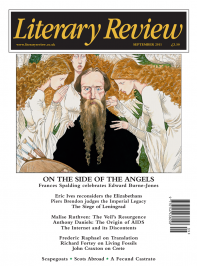Dominic Sandbrook
Rules for Literary Survival
More than a decade ago, when I was a bored postgraduate student, I became obsessed with the work of Kingsley Amis. I had read Lucky Jim before, and thought it not as funny as it should have been; but now I reread it and found it wonderful. So I started working my way through Amis’s other novels. Very few of them were in print: even a decent Waterstones usually had only Lucky Jim and The Old Devils. Online shopping was in its infancy, so I relied on second-hand bookshops to get the others. Even a visit to the most obscure market town carried a frisson of excitement: would that battered little bookstall hold a dog-eared copy, of, say, The Riverside Villas Murder? Would this be the day I finally tracked down Amis’s James Bond novel, Colonel Sun?
What all this reflected, of course, was the fact that shares in Amis were at a discount. He had died only a few years earlier, and his literary reputation seemed to be entering an inevitable eclipse. ‘He’s nowhere near as good as his son,’ said a friend of

Sign Up to our newsletter
Receive free articles, highlights from the archive, news, details of prizes, and much more.@Lit_Review
Follow Literary Review on Twitter
Twitter Feed
Under its longest-serving editor, Graydon Carter, Vanity Fair was that rare thing – a New York society magazine that published serious journalism.
@PeterPeteryork looks at what Carter got right.
Peter York - Deluxe Editions
Peter York: Deluxe Editions - When the Going Was Good: An Editor’s Adventures During the Last Golden Age of Magazines by Graydon Carter
literaryreview.co.uk
Henry James returned to America in 1904 with three objectives: to see his brother William, to deliver a series of lectures on Balzac, and to gather material for a pair of books about modern America.
Peter Rose follows James out west.
Peter Rose - The Restless Analyst
Peter Rose: The Restless Analyst - Henry James Comes Home: Rediscovering America in the Gilded Age by Peter Brooks...
literaryreview.co.uk
Vladimir Putin served his apprenticeship in the KGB toward the end of the Cold War, a period during which Western societies were infiltrated by so-called 'illegals'.
Piers Brendon examines how the culture of Soviet spycraft shaped his thinking.
Piers Brendon - Tinker, Tailor, Sleeper, Troll
Piers Brendon: Tinker, Tailor, Sleeper, Troll - The Illegals: Russia’s Most Audacious Spies and the Plot to Infiltrate the West by Shaun Walker
literaryreview.co.uk